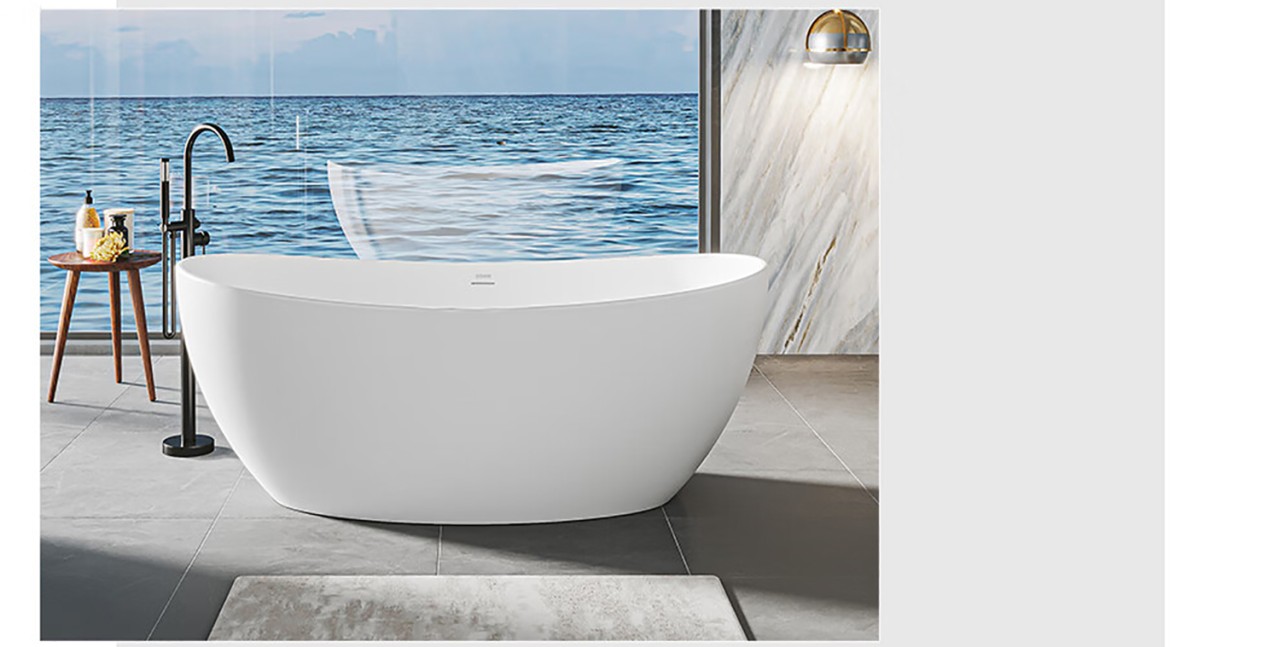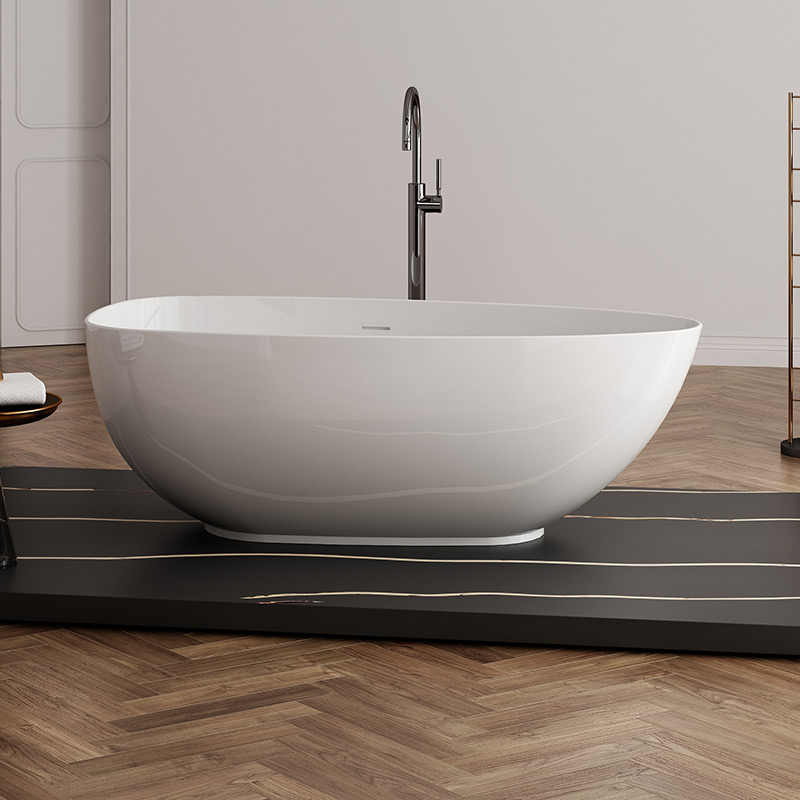What Is Artificial Stone Bathtub?
An artificial stone bathtub is a type of bathtub that is made from a combination of natural stone and man-made materials. These bathtubs are designed to look like natural stone and have all the advantages of a traditional bathtub, such as durability, water resistance, and ease of cleaning. Artificial stone bathtubs are becoming increasingly popular due to their beauty, affordability, and the fact that they are more resistant to staining and fading. They are also often more resistant to temperature fluctuations and are less likely to crack or chip than traditional stone bathtubs.
Definition of Artificial Stone Bathtub
An artificial stone bathtub is a type of bathtub made from a combination of natural and synthetic materials. It is usually composed of a blend of quartz and acrylic resins that are molded and hardened into a bathtub form. This type of bathtub is designed to be extremely durable, hygienic, and aesthetically pleasing. Artificial stone bathtubs are highly sought after for their resilience to wear and tear, their ability to resist staining, and their resistance to heat. They are also known for being able to retain heat longer than traditional acrylic or fiberglass tubs, making them more energy efficient. Additionally, they are easier to clean and maintain due to their non-porous surfaces. Artificial stone bathtubs come in a variety of styles, colors, and shapes to fit any bathroom design. They are an ideal choice for those seeking a luxurious bath experience while still maintaining a budget.
Types of Artificial Stone Bathtubs
Artificial stone bathtubs are the perfect way to add a touch of luxury to any bathroom. They come in a variety of styles and sizes, making it easy to find one that fits the aesthetic of your bathroom. But what exactly is artificial stone and what types of bathtubs are available?
Artificial stone, also known as engineered stone, is a man-made material that is made from a combination of natural stone, resins, and pigments. This material is designed to mimic the look and feel of natural stone but without the need for expensive and intensive maintenance. As a result, it is an ideal choice for those who want to enjoy the beauty of natural stone without worrying about upkeep.
When it comes to artificial stone bathtubs, there are several options to choose from. These include freestanding, drop-in, and built-in models, each of which offers unique benefits and features. Freestanding models are a great choice for those who want a large, luxurious bathtub that can be easily moved from one spot to another. Drop-in models are a great choice for those who want to save on floor space while still having a luxurious bathtub experience. Finally, built-in models are a great choice for those who want to incorporate their bathtub into the existing design of their bathroom, creating a seamless look and feel.
No matter which type of artificial stone bathtub you choose, you can be sure that you will be getting a luxurious and unique bath experience. With so many options to choose from, you are sure to find the perfect bathtub for your needs.

Credit: www.linkedin.com
Advantages of Artificial Stone Bathtubs
Artificial stone bathtubs are increasingly becoming the go-to choice for modern bathrooms. Synthetic stone bathtubs are made from a composite material that mimics the look and feel of real stone without the weight and cost. Not only do these tubs look great, but they also offer several advantages to those who choose them.
For starters, artificial stone bathtubs are incredibly durable and resistant to chipping, cracking, and fading. They also require very little maintenance, as they can be easily cleaned with a damp cloth. They are also resistant to heat, meaning they can be used with hot water without fear of damage. Additionally, these tubs are easy to install and are available in a variety of sizes and shapes to fit any bathroom.
On top of all that, synthetic stone bathtubs are more affordable than real stone tubs. This makes them an attractive option for those on a tighter budget. Additionally, their lightweight construction makes them easy to move and install in any bathroom.
Overall, artificial stone bathtubs offer a wide range of benefits for those looking to upgrade their bathroom. From durability to affordability, to ease of installation, these tubs can meet the needs of any homeowner.
Disadvantages of Artificial Stone Bathtubs
Artificial stone bathtubs are an attractive and often affordable option for bathrooms. However, there are some drawbacks to consider before purchasing an artificial stone bathtub. The most obvious disadvantage is that artificial stone is not as strong and durable as natural stone. Artificial stone is more prone to cracks and chips, making it less resistant to water, heat, and impacts compared to natural stone. Additionally, artificial stone is more prone to staining than natural stone and may require regular sealant applications. The color of artificial stone may also fade over time, making it less aesthetically pleasing compared to natural stone. Finally, artificial stone is not as easy to repair as natural stone and can be difficult to match during replacements. Before deciding on an artificial stone bathtub, it is important to weigh all of these disadvantages and compare them to the cost savings of choosing an artificial stone bathtub.
Maintenance and Cleaning of Artificial Stone Bathtubs
Artificial stone bathtubs are a popular choice for many homeowners as they offer an elegant and durable alternative to traditional porcelain and acrylic bathtubs. These bathtubs are made of a combination of quartz and other minerals, providing a resilient and beautiful surface. However, like any other bathroom fixture, artificial stone bathtubs will require regular maintenance and cleaning to keep them looking and functioning at their best.
Cleaning your artificial stone bathtub requires a few simple steps to keep the surface looking new. The first step is to clean the tub with a mild soap and a soft cloth. This will help to remove dirt and debris from the surface and should be done at least once a week. After cleaning the tub, it is important to seal the surface with a natural sealer to protect it against staining and discoloration. This sealer should be reapplied every six months or as needed.
When using cleaning products, it is important to use products that are safe for use on artificial stone. Harsh cleaning chemicals can damage the surface and can cause discoloration. Additionally, it is important to avoid using abrasive cleaning materials which can dull the surface of your artificial stone bathtub.
With proper maintenance and cleaning, your artificial stone bathtub will remain beautiful and durable for many years to come. By following these tips, you can ensure that your bathtub will look and function its best for years to come.
Cost of Artificial Stone Bathtubs
Artificial stone bathtubs have become increasingly popular in recent years due to their durability and luxurious look. If you’re considering an artificial stone bathtub for your home, you’re probably wondering what the cost is. The cost of an artificial stone bathtub can vary significantly depending on the size and type. Generally, artificial stone bathtubs are more expensive than other materials such as fiberglass or acrylic, but they can be more cost-effective in the long run.
The price of an artificial stone bathtub can range from a few hundred dollars to thousands of dollars, depending on the size and style. Additionally, installation costs can add to the total cost. On average, you can expect to pay between $1,000 and $5,000 for a new artificial stone bathtub. The installation of the bathtub can add anywhere from $500 to $1,500 to the total cost.
When considering the cost of an artificial stone bathtub, it’s important to factor in the long-term savings. Artificial stone bathtubs are highly durable and require little to no maintenance, meaning you’ll save money on repairs and replacement costs. Additionally, due to their luxurious look, artificial stone bathtubs can add significant value to your home. Ultimately, the cost of an artificial stone bathtub is a worthwhile investment that can provide many years of use.
Installation of Artificial Stone Bathtubs
Artificial stone bathtubs have revolutionized the way we think about bathroom design. Constructed from a combination of high-quality quartz, natural stone, and other synthetic materials, these impressive and durable bathtubs offer a stylish and luxurious way to enjoy your bathing experience. And, when it comes to installation, artificial stone bathtubs are surprisingly easy to install and maintain. This article will explore the basics of artificial stone bathtub installation, so you can make the most of your new bathtub.
Installing an artificial stone bathtub is relatively simple. First, the bathtub is placed in the desired location. The bathtub should then be leveled and secured into place with a metal mounting plate. Next, the drain and plumbing are connected to the bathtub, and the taps are installed. Finally, the artificial stone is applied to the bathtub’s surface, followed by a sealant to protect it from water damage and other elements.
Although artificial stone bathtubs are relatively easy to install, it is important to hire a professional to ensure that the installation is done correctly. A professional will be able to assess the situation and make sure all the necessary components are in place for a successful installation. Additionally, a professional will be able to provide advice on how to properly maintain your artificial stone bathtub, helping to extend its lifespan.
In summary, artificial stone bathtubs offer a luxurious and stylish way to enjoy your bathroom. They are relatively easy to install and maintain, and when done correctly, can provide years of enjoyment. For a successful installation, it is important to hire a professional to ensure the job is done right. With the proper care and maintenance, your artificial stone bathtub will provide you with years of reliable use.
FAQs About the What Is Artificial Stone Bathtub?
1. What are the benefits of an artificial stone bathtub?
A: Artificial stone bathtubs are usually made from a composite material, which is strong and durable. They are non-porous, meaning they are resistant to staining and bacteria, and are easy to clean and maintain. They also tend to be more affordable than traditional stone bathtubs.
2. How do you care for an artificial stone bathtub?
A: To keep the surface of your artificial stone bathtub looking its best, it is important to clean it regularly with a mild soap and warm water. Avoid using harsh chemicals or abrasive materials, as these can damage the surface of the bathtub. It is also important to reseal the bathtub every few years to maintain its integrity.
3. Is an artificial stone bathtub more expensive than a traditional stone bathtub?
A: Generally, no. Artificial stone bathtubs are usually more affordable than traditional stone bathtubs, making them a popular choice for homeowners.
Conclusion
Overall, artificial stone bathtubs are a great option for those looking for a luxurious, unique, and low-maintenance bathtub. These bathtubs are made from a durable composite material that is incredibly strong and designed to last for many years. They come in a variety of shapes, sizes, and colors to fit any style of bathroom. Artificial stone bathtubs are an excellent choice for those who want a luxurious and unique bathtub without the hassle of having to maintain it.





